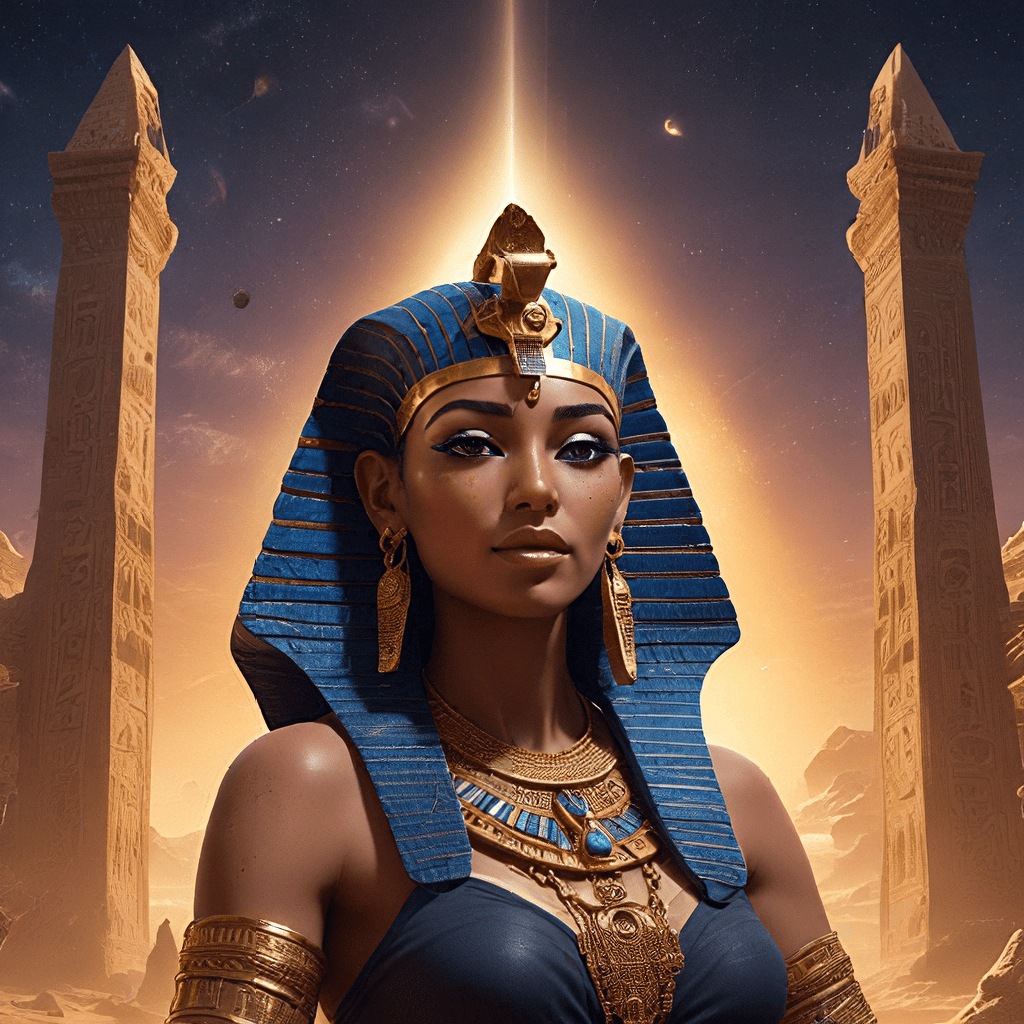The Cosmic Symphony: The Music of the Egyptian Universe
In ancient Egypt, the universe was seen as a grand symphony, a harmonious interplay of divine forces, celestial bodies, and human life. Music played a central role in this cosmic order, serving as a bridge between the earthly and the divine, a language of creation, and a reflection of the rhythms of life and death.
1. The Divine Orchestra: Deities as Musicians
Music was deeply intertwined with Egyptian religious practices. Rituals and ceremonies were accompanied by music, believed to resonate with the gods and influence their favor. The gods themselves were seen as skilled musicians, playing instruments and composing melodies that shaped the cosmos.
Thoth, the god of wisdom and knowledge, was often depicted playing the harp, symbolizing the power of music to unlock divine wisdom. Hathor, the goddess of love, beauty, and music, was associated with the sistrum, a rattle-like instrument that evoked her joyful energy. Bastet, the goddess of protection and joy, was linked to the flute, representing the playful and graceful aspects of her nature.
Other deities, including Osiris, Horus, and Anubis, were also associated with specific instruments, each reflecting their unique attributes and roles in the cosmic order. These instruments, including harps, flutes, sistrums, drums, and lyres, weren’t merely tools for entertainment but sacred objects that connected the earthly realm to the divine.
2. The Celestial Harmony: The Music of the Cosmos
The ancient Egyptians believed that the celestial bodies, the sun, moon, stars, and planets, were musical instruments, their movements creating celestial harmonies. The “cosmic dance” of these celestial bodies was seen as a symphony of light, energy, and sound, a grand orchestra orchestrated by the gods.
The cyclical nature of the universe, the daily journey of the sun, the phases of the moon, and the movements of the stars, were all believed to be guided by musical principles. The Egyptians saw these cycles as a reflection of the divine order, a constant flow of energy and transformation represented through the music of the cosmos.
3. The Rhythms of Creation: The Music of Life
The creation myth, a central narrative in Egyptian mythology, emphasized the role of music in bringing the world into existence. At the beginning of time, the god Atum, emerging from the primordial waters, uttered the first sound, the “word,” which created the universe. This sound, a divine vibration, was the spark of creation, the foundation upon which the cosmos was built.
This concept highlights the importance of sound and vibration in the creation process. The Egyptians believed that music resonated with the life force, the “Ka,” and played a role in shaping the world and its inhabitants. The “heart beat” of the universe, the rhythmic flow of energy that sustains all life, was understood through musical principles.
4. The Journey of the Sun: The Music of Day and Night
The sun god Ra, the source of life and light, was said to journey across the sky in a celestial barge, bringing forth dawn, midday, and dusk. Each phase of his journey was associated with different musical qualities, reflecting the changing energy of the day.
The music of dawn was characterized by bright, uplifting melodies, marking the beginning of a new cycle. The music of noon was more powerful and intense, reflecting the sun’s peak energy. The music of dusk was softer, more contemplative, signaling the transition to night and the realm of the underworld.
The symbolism of light and darkness in music was deeply ingrained in Egyptian culture. Light, associated with creation and life, was represented through bright and joyful melodies. Darkness, associated with the underworld and the afterlife, was often reflected in more somber and mournful tones.
5. The Underworld Symphony: The Music of Death and Rebirth
The journey of the soul through the underworld, a crucial aspect of Egyptian belief, was also accompanied by music. The afterlife was not seen as a place of eternal darkness but a realm of transformation, where the soul was purified and judged for its earthly deeds.
The music of the afterlife consisted of hymns, chants, and laments, expressing the soul’s hopes, fears, and aspirations. This music played a role in the process of purification, guiding the soul through trials and helping it to connect with the divine. Music was a powerful tool for transformation, aiding in the transition from earthly life to eternal existence.
6. The Music of Kingship: The Divine Right to Rule
Pharaohs, the rulers of Egypt, were seen as divine musicians, embodying the power and wisdom of the gods. They were believed to have the ability to harness the power of music to invoke the favor of the gods, maintain order in the kingdom, and ensure the prosperity of the land.
The royal court was a center of musical activity, with skilled musicians performing for the pharaoh and his entourage. These musicians not only entertained but also contributed to the religious and political rituals, reinforcing the pharaoh’s authority and ensuring the continuation of the divine order.
7. The Music of the People: Rituals, Festivals, and Daily Life
Music was not limited to religious ceremonies and royal courts. It was an integral part of everyday life in ancient Egypt. Work songs helped laborers to synchronize their movements and lighten their tasks. Lullabies soothed infants and guided them into sleep.
Festivals and celebrations were filled with music, dance, and joyful revelry. Music played a vital role in community bonding, cultural expression, and connecting people with their ancestral traditions. It was a universal language, transcending social boundaries and bringing people together to celebrate life, honor the gods, and remember the past.
From the grand celestial harmonies to the simple tunes of everyday life, music was a fundamental element of the ancient Egyptian world. It was a language of the gods, a reflection of the cosmic order, and a powerful force that shaped the lives of the people.




